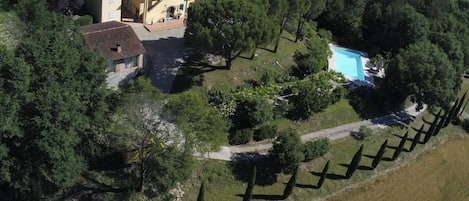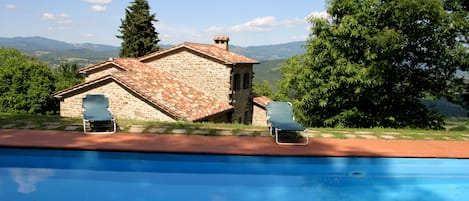Ganzes Ferienhaus·Privater Gastgeber
VILLA-Two Birds-La Villa ARTE del Lupo. Verborgenes Juwel in der Toskana
Fotogalerie von VILLA-Two Birds-La Villa ARTE del Lupo. Verborgenes Juwel in der Toskana

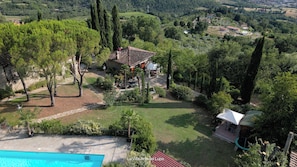


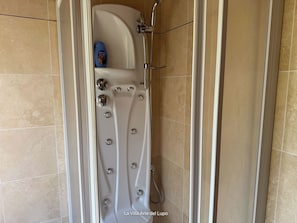
1 Schlafzimmer1 BadezimmerPlatz für 4 Gäste45 m²
Beliebte Annehmlichkeiten
Lerne die Gegend kennen
Subbiano, Arezzo
- Castelnuovo di Subbiano36 Autominuten
- Piazza Grande48 Autominuten
- Kloster La Verna66 Autominuten
Zimmer und Betten
1 Schlafzimmer (Platz für 4 Personen)
Schlafzimmer 1
1 Doppelbett
1 Badezimmer
Badezimmer 1
Weitere Räumlichkeiten
Terrasse oder Patio
Küche
Spielbereich im Freien
Garten
Mehr zu dieser Unterkunft
VILLA-Two Birds-La Villa ARTE del Lupo. Verborgenes Juwel in der Toskana
Willkommen in unserem verborgenen Juwel in der Toskana! Unser wunderschöner Rückzugsort bietet die perfekte Kombination aus Kunst und Entspannung unter einem Dach. Kommt und entspannt euch in unserer friedlichen Oase und lasst eure Seele baumeln.
Die Villa besitzt vier verschmuste Golden Retriever und zwei kleine MaineCoon Kater , die einen durch ihre sanfte Art den Alltag vergessen lassen.4000qm Garten mit Pool in traumhafter Panoramalage.
Subbiano liegt in der Mitte der wichtigsten Sehenswürdigkeiten und eignet sich damit perfekt für Tagesausflüge vieler berühmter Städte, wie z.b Florenz, Siena, Pisa,Volterra, Montepulciano, Perugia,
Trasimenosee, Castiglione del Lago, Citta di Castello.Fahren sie in das berühmte Val di Chiana.Besuchen sie La Villa mit Ihren Köstlichkeiten.All diese Traumziele sind zwischen 15min bis 1,5Std erreichbar.
Jeder, der einen Traum hat, sollte nach Italien gehen.
Es spielt keine Rolle, ob Sie denken, der Traum sei tot und begraben,
in Italien wird er auferstehen und wahr werden
(Elizabeth Spencer)
The Villa del ARTE del Lupo – Not just a place to stay…
FROM WAYNE ANTHONY-08-2024
Nestled atop the rolling hills of Tuscany, the Villa del ARTE del Lupo offers not only a relaxing place to
stay, but a place where history, art, and mysticism converge in a glimpse of Italy’s historic past. The
property has served various purposes over its long life: a rest stop for travelers, a religious retreat, an
extensive family home, and now a place for guests to experience the beauty of Tuscany. While enjoying
a relaxing stay, however, guests should make time to explore the unique grounds, which, with open
eyes, give the keen observer a chance to explore a slice of the unique two-thousand year history of the
Italian countryside.
For the curious, consider a simple stroll around the property. Terraces carefully cut into the land provide
level areas for agriculture. Massive fig trees and orchards once offered fruit in their season. Cisterns,
now dry, attest to hidden Roman engineering. Traces of ancient lanes lead to hidden groves, pavilions,
and bowers, lost to the mysteries of time.
In fact, the approach to the Villa is one of the primary roads of ancient Rome, the Via Romea Germanica.
Around 1236 AD, this way transformed into a religious pilgrimage route linking Stade, Germany in the
north to the Vatican at Rome in the south. This historic road passes directly in front of the main Villa,
bisecting the land. Today, it is marked with two historical markers citing the mileage to either terminus.
Approaching the Villa from the south on this road and traveling up the hill, the land is lined with several
vineyards, fruit groves, and farms which originally provided food for the estate above. Aging
outbuildings still remain gently slipping away, a testament to effects of time. Small access lanes, now
wildly overgrown, wind away and lead to places long forgotten. As the house nears, on the left a storage
area, erected by a former owner, boasts stacked remains of historic stone work rescued from the
surrounding countryside. Upon arrival at the Villa, four unique markers clearly delineate the beginning
of the main compound.
The first of these sits to the right of the road, a large, arch-shaped stone. Protruding from its flat face, a
carved relief of an unknown pagan deity stands sentinel. Its features have been brutally defaced,
possibly in the Middle Ages, when the site was transformed from a pagan wayside to a Christian
nunnery, but its placement is clear. Even the early Romans sought the gods’ protection of their land.
On the left, across from the stone marker, sits the corner wall of the main entrance. Herein is set a
definitive reminder of the Christian conversion. An icon of Michael the Archangel defeating the Dragon
of Evil (Revelation 12:7 in the Bible), proclaims a notice of divine protection--no evil dare enter this
sacred site. In his hands, Michael wields a sword of victory and holds the scales of justice weighing the
hearts of all. His foot crushes the head of the defeated dragon.
Before the shrine is placed a kneeling plinth for prayer. To the right, a candle nook offers light to the way
of the pilgrims. Within the nook is the seal of the Grand Master of the Knight’s Templar, showing their
approval and use of the land as a safe haven for pilgrims. A Templer Knight with shield rides his steed;
circling is the Templar motto: Cristi sigillum militum (Seal of the Soldiers of Christ). Above, inscribed in
the plaster work, are the words “Io credo” (I believe). To the right of this sits an ambiguous symbol--a
circle with four petals, possibly a Greek Chi (the symbol of Christ) or a marker of the four Gospels
(Matthew, Mark, Luke, and John).
Continuing down the wall to the left of the icon, is another pair of markers. First, a half circle niche
which most likely held a statue of a local pagan god, is now bricked over. Then, a fresco triumvirate of
three women bathing naked in a spring, possibly water nymphs, is beside. In the far background of the
fresco, a depiction of the Villa can be seen. This enigmatic artwork stands in direct opposition to its
Christian neighbors--that is until entering the property through the passage just beside. Behind, not fifty
feet from the image is a well, a sacred spring. The fresco is a beacon for travelers on the road that there
is water for the thirsty weary available. This wellspring is likely an outlet of another amazing feature of
this property: through a variety of hidden underground waterways, the entire complex is feed water
directly from a hidden lake further up the hill
Finally, moving another twenty feet further down the entrance wall, is a final historical feature. Built
into the wall are the durchreiche, or ‘pass throughs.’ These two large, brick-lined circular openings date
from the time the property housed a cloistered nunnery. They allowed the surrounding community to
bring supplies to the Order, and pass these through to those cloistered and secluded within.
From this point, returning the Via Romane, the property unfolds. A tall stone wall lines the road to the
right. This creates a terrace on the hill above upon which sets the various buildings of the main property.
This wall opens to a car park beyond which and below lies a terraced planting area which most likely
served as kitchen garden for the medieval nunnery. Above this terrace, across the Roman road, is an
area which formed a meditation garden (not accessible as a part of the current property).
The rest of the complex consists of a sprawling number of buildings which have been adapted and
adorned by the work of the last previous owner. The grounds sport stoneware salvaged from the
surrounding countryside. Animals, water basins, and reclaimed building materials are artistically
incorporated everywhere and are worth a careful examination. Cast a glance upward as well, as the
stonework is even incorporate into the chimneys and roof features.
Finally, the four corners of main house’s eave are adorned with metal lilies, the symbol of
Easter—resurrection, hope, rebirth and blessing. This seems a curious addition until entering the
house’s kitchen. Just inside, a nook houses a painted icon of Mary holding Jesus. She keeps watch over
all who enter, and in his hands, the Christ Child holds a sprig of lilies, clearly the symbol of His blessing
and favor upon the house and all who enter.
Die Villa besitzt vier verschmuste Golden Retriever und zwei kleine MaineCoon Kater , die einen durch ihre sanfte Art den Alltag vergessen lassen.4000qm Garten mit Pool in traumhafter Panoramalage.
Subbiano liegt in der Mitte der wichtigsten Sehenswürdigkeiten und eignet sich damit perfekt für Tagesausflüge vieler berühmter Städte, wie z.b Florenz, Siena, Pisa,Volterra, Montepulciano, Perugia,
Trasimenosee, Castiglione del Lago, Citta di Castello.Fahren sie in das berühmte Val di Chiana.Besuchen sie La Villa mit Ihren Köstlichkeiten.All diese Traumziele sind zwischen 15min bis 1,5Std erreichbar.
Jeder, der einen Traum hat, sollte nach Italien gehen.
Es spielt keine Rolle, ob Sie denken, der Traum sei tot und begraben,
in Italien wird er auferstehen und wahr werden
(Elizabeth Spencer)
The Villa del ARTE del Lupo – Not just a place to stay…
FROM WAYNE ANTHONY-08-2024
Nestled atop the rolling hills of Tuscany, the Villa del ARTE del Lupo offers not only a relaxing place to
stay, but a place where history, art, and mysticism converge in a glimpse of Italy’s historic past. The
property has served various purposes over its long life: a rest stop for travelers, a religious retreat, an
extensive family home, and now a place for guests to experience the beauty of Tuscany. While enjoying
a relaxing stay, however, guests should make time to explore the unique grounds, which, with open
eyes, give the keen observer a chance to explore a slice of the unique two-thousand year history of the
Italian countryside.
For the curious, consider a simple stroll around the property. Terraces carefully cut into the land provide
level areas for agriculture. Massive fig trees and orchards once offered fruit in their season. Cisterns,
now dry, attest to hidden Roman engineering. Traces of ancient lanes lead to hidden groves, pavilions,
and bowers, lost to the mysteries of time.
In fact, the approach to the Villa is one of the primary roads of ancient Rome, the Via Romea Germanica.
Around 1236 AD, this way transformed into a religious pilgrimage route linking Stade, Germany in the
north to the Vatican at Rome in the south. This historic road passes directly in front of the main Villa,
bisecting the land. Today, it is marked with two historical markers citing the mileage to either terminus.
Approaching the Villa from the south on this road and traveling up the hill, the land is lined with several
vineyards, fruit groves, and farms which originally provided food for the estate above. Aging
outbuildings still remain gently slipping away, a testament to effects of time. Small access lanes, now
wildly overgrown, wind away and lead to places long forgotten. As the house nears, on the left a storage
area, erected by a former owner, boasts stacked remains of historic stone work rescued from the
surrounding countryside. Upon arrival at the Villa, four unique markers clearly delineate the beginning
of the main compound.
The first of these sits to the right of the road, a large, arch-shaped stone. Protruding from its flat face, a
carved relief of an unknown pagan deity stands sentinel. Its features have been brutally defaced,
possibly in the Middle Ages, when the site was transformed from a pagan wayside to a Christian
nunnery, but its placement is clear. Even the early Romans sought the gods’ protection of their land.
On the left, across from the stone marker, sits the corner wall of the main entrance. Herein is set a
definitive reminder of the Christian conversion. An icon of Michael the Archangel defeating the Dragon
of Evil (Revelation 12:7 in the Bible), proclaims a notice of divine protection--no evil dare enter this
sacred site. In his hands, Michael wields a sword of victory and holds the scales of justice weighing the
hearts of all. His foot crushes the head of the defeated dragon.
Before the shrine is placed a kneeling plinth for prayer. To the right, a candle nook offers light to the way
of the pilgrims. Within the nook is the seal of the Grand Master of the Knight’s Templar, showing their
approval and use of the land as a safe haven for pilgrims. A Templer Knight with shield rides his steed;
circling is the Templar motto: Cristi sigillum militum (Seal of the Soldiers of Christ). Above, inscribed in
the plaster work, are the words “Io credo” (I believe). To the right of this sits an ambiguous symbol--a
circle with four petals, possibly a Greek Chi (the symbol of Christ) or a marker of the four Gospels
(Matthew, Mark, Luke, and John).
Continuing down the wall to the left of the icon, is another pair of markers. First, a half circle niche
which most likely held a statue of a local pagan god, is now bricked over. Then, a fresco triumvirate of
three women bathing naked in a spring, possibly water nymphs, is beside. In the far background of the
fresco, a depiction of the Villa can be seen. This enigmatic artwork stands in direct opposition to its
Christian neighbors--that is until entering the property through the passage just beside. Behind, not fifty
feet from the image is a well, a sacred spring. The fresco is a beacon for travelers on the road that there
is water for the thirsty weary available. This wellspring is likely an outlet of another amazing feature of
this property: through a variety of hidden underground waterways, the entire complex is feed water
directly from a hidden lake further up the hill
Finally, moving another twenty feet further down the entrance wall, is a final historical feature. Built
into the wall are the durchreiche, or ‘pass throughs.’ These two large, brick-lined circular openings date
from the time the property housed a cloistered nunnery. They allowed the surrounding community to
bring supplies to the Order, and pass these through to those cloistered and secluded within.
From this point, returning the Via Romane, the property unfolds. A tall stone wall lines the road to the
right. This creates a terrace on the hill above upon which sets the various buildings of the main property.
This wall opens to a car park beyond which and below lies a terraced planting area which most likely
served as kitchen garden for the medieval nunnery. Above this terrace, across the Roman road, is an
area which formed a meditation garden (not accessible as a part of the current property).
The rest of the complex consists of a sprawling number of buildings which have been adapted and
adorned by the work of the last previous owner. The grounds sport stoneware salvaged from the
surrounding countryside. Animals, water basins, and reclaimed building materials are artistically
incorporated everywhere and are worth a careful examination. Cast a glance upward as well, as the
stonework is even incorporate into the chimneys and roof features.
Finally, the four corners of main house’s eave are adorned with metal lilies, the symbol of
Easter—resurrection, hope, rebirth and blessing. This seems a curious addition until entering the
house’s kitchen. Just inside, a nook houses a painted icon of Mary holding Jesus. She keeps watch over
all who enter, and in his hands, the Christ Child holds a sprig of lilies, clearly the symbol of His blessing
and favor upon the house and all who enter.
Unterkunftsmanager
Ulrich Wolf
Sprachen
Englisch, Deutsch
Schütze deine Zahlung – buche immer über FeWo-direkt
Wenn dich jemand bittet, außerhalb unserer Plattform zu buchen oder zu zahlen, bevor du auf FeWo-direkt buchst, teile uns dies bitte mit.
Gib zur Preisangabe die Daten an
Ausstattung
Pool
Küche
Waschmaschine
Wäschetrockner
Kostenloses WLAN
Klimaanlage
Ähnliche Unterkünfte
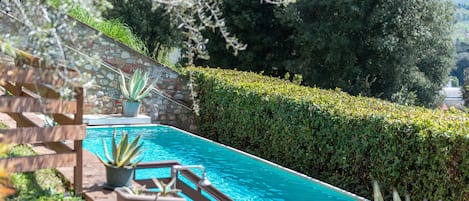
Ferienhaus "Altrove" mit Privatem Pool, Privater Terrasse und WLAN
Ferienhaus "Altrove" mit Privatem Pool, Privater Terrasse und WLAN
- Pool
- Küche
- Waschmaschine
- Haustiere erlaubt
Hausordnung
Check-in ab 16:00 Uhr
Mindestalter für die Miete: 18 Jahre
Check-out vor 11:00 Uhr
Kinder
Kinder (13–17 Jahre) erlaubt
Veranstaltungen
Veranstaltungen sind nicht gestattet
Haustiere
Keine Haustiere erlaubt
Rauchen
Rauchen ist nicht gestattet
Wichtige Informationen
Wissenswertes
Diese Unterkunft wird von einem privaten Gastgeber verwaltet (eine Partei, die nicht im Rahmen ihrer gewerblichen, geschäftlichen oder beruflichen Tätigkeit handelt). Das EU-Verbraucherrecht, einschließlich Widerrufsrecht, gilt nicht für deine Buchung, sie wird jedoch von den vom privaten Gastgeber festgelegten Stornierungsbedingungen abgedeckt.
Für zusätzliche Personen fallen möglicherweise Gebühren an, die abhängig von den Bestimmungen der Unterkunft variieren können.
Beim Check-in werden ggf. ein Lichtbildausweis und eine Kreditkarte, Debitkarte oder Kaution in bar für unvorhergesehene Aufwendungen verlangt.
Je nach Verfügbarkeit beim Check-in wird versucht, Sonderwünschen entgegenzukommen, sie können jedoch nicht garantiert werden. Eventuell fallen zusätzliche Gebühren an.
Partys oder Gruppenveranstaltungen sind auf dem Gelände der Unterkunft streng verboten.
Der Gastgeber hat angegeben, dass die Unterkunft über einen Kohlenmonoxidmelder verfügt
Der Gastgeber hat angegeben, dass es in der Unterkunft einen Rauchmelder gibt
Registrierungsnummer der Unterkunft: IT051002C235ZRT9KL
Was wir noch erwähnen sollten
Alle Gäste, auch Kinder, müssen beim Check-in anwesend sein und einen amtlichen Lichtbildausweis bzw. Reisepass vorlegen
Aufgrund nationaler Bestimmungen sind Bargeldtransaktionen in dieser Unterkunft nur bis zu einer Höhe von 5000 EUR erlaubt. Weitere Informationen erhältst du auf Nachfrage direkt bei der Unterkunft. Die Kontaktdaten findest du auf deiner Buchungsbestätigung.
Zur Gegend
Subbiano
Mitten in Subbiano befindet sich dieses Ferienhaus. Zu den kulturellen Höhepunkten gehört Folgendes: Museo di Casa Vasari und Museo Statale d'Arte Medievale e Moderna. Darüber hinaus bietet die Region Sehenswürdigkeiten wie Burg von Fioraia und Pieve di San Martino Sopr'Arno. Ebenfalls einen Besuch wert sind diese beiden Highlights: Ravagni Ölmühle und Fattoria La Vialla.
Subbiano, Arezzo
In der Umgebung
- Castelnuovo di Subbiano - 36 Autominuten - 15.4 km
- Privates Krankenhaus Centro Chirurgico Toscano - 43 Autominuten - 23.5 km
- Kathedrale von Arezzo - 45 Autominuten - 24.9 km
- Piazza Grande - 48 Autominuten - 25.7 km
- Kloster La Verna - 66 Autominuten - 40.6 km
Fortbewegung vor Ort
Restaurants
- La Corte Dell'Oca - 32 Autominuten
- Terramira - 34 Autominuten
- Torre Santa Flora - 31 Autominuten
- Pizzeria Spaghetteria Tucano - 31 Autominuten
- Pizza Inn - Ristorante - 32 Autominuten
Häufig gestellte Fragen
Bewertungen
Bewertungen
Es gibt noch keine Bewertungen
Du kannst nach deinem Aufenthalt die erste Bewertung zu dieser Unterkunft abgeben.
Über den Gastgeber
Zu Gast bei Ulrich Wolf
Sprachen:
Englisch, Deutsch
Wie können wir unsere Website verbessern?Feedback eingeben
